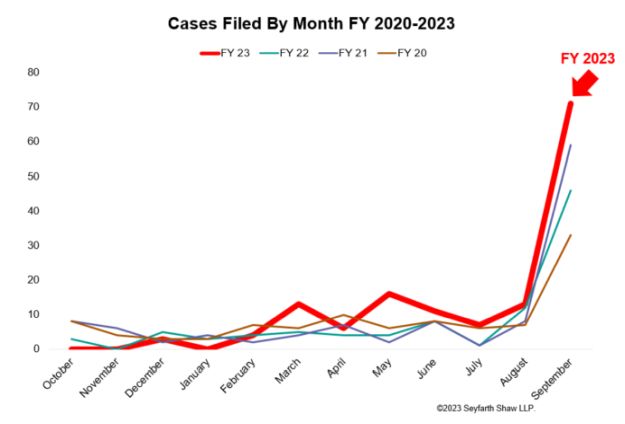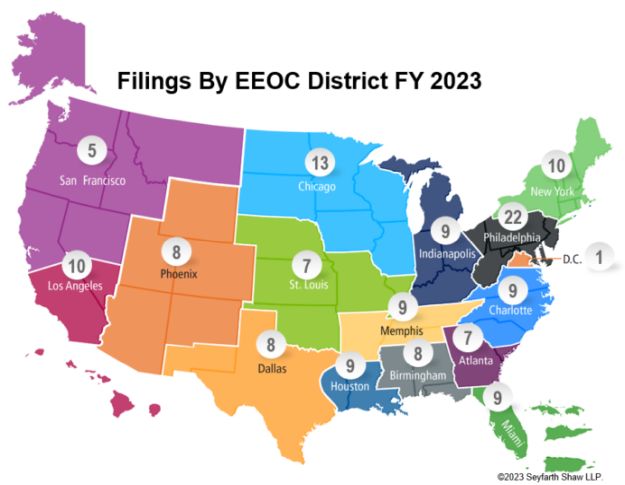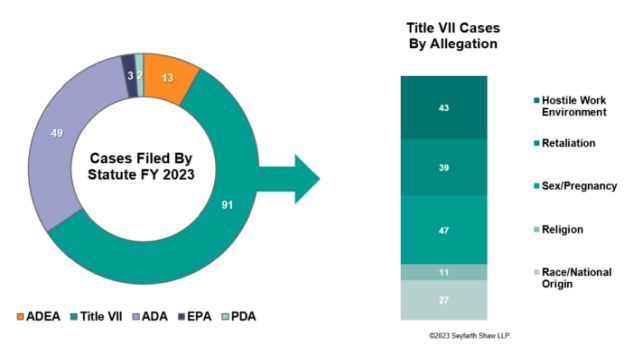Seyfarth Synopsis: Following the EEOC's aggressive litigation posture in the Obama-era, the Commission's federal case filings has been markedly sluggish, at least in part because of transitions in leadership. Seyfarth forecasted changes were imminent in FY 2023, with the EEOC's hefty budget increase and a likely Democratic majority, and we further anticipated a substantial increase in filings from the Commission this year. The EEOC did not disappoint. The EEOC wrapped FY 2023 with a jaw-dropping 144 filings at the time of publication, which represents a five-year high in EEOC merit lawsuits. The EEOC even touted in an evening press release trumpeting that it had filed 50% more suits than in the previous year. An analysis of the EEOC's case filing metrics in overdrive—along with the timing, location, and type of claims asserted in these lawsuits—signal that the EEOC is returning to a heightened level of litigation activity not seen in years.
As we have reported in prior EEOC year-end reports (see FY 2022, FY 2021, and FY 2020), the Commission's filing activity has taken a significant downturn since the beginning of the COVID-19 pandemic. Indeed, over the last three years the Commission has struggled to file more than 100 merit lawsuits each year. This is a substantial plunge from the EEOC's sizeable filing numbers under the Obama administration, when upward of 300 merit suits were filed in some years.
Moving into FY 2023, the EEOC appeared primed to increase its litigation activity in light of a change in administration, a sizeable budget increase, and a pending Democratic Commissioner (Kalpana Kotagal) nominated by President Biden. That final piece of the puzzle did not fall into place until July 13, 2023, when the U.S. Senate confirmed Commissioner Kotagal, ending a 2-2 political stalemate at the EEOC and tilting the Agency in favor of the three Democratic Commissioners.
Perhaps not surprisingly given the initial vacancy while waiting for Commissioner Kotagal's confirmation, the Commission saw a slow start to FY 2023; the EEOC filed only three lawsuits in the first four months of its fiscal year. Despite this sluggish start, the EEOC quickly ramped up its filing numbers in the spring with 13 lawsuits filed in March 2023, a number far above the norm for a typical year. This was followed by a notably active May in which the EEOC filed a total of 16 lawsuits, making it the busiest non-September filing month since FY 2019. Finally, the EEOC ended its fiscal with a dramatic last-minute filing surge, lodging 13 lawsuits in August and an eye-popping 71 lawsuits in September alone. Altogether, the EEOC finished its year with 144 merit filings in FY 2023. In the last hours of its fiscal year, the EEOC took a victory lap by launching a press release touting its case-filing accomplishments. But the EEOC's September 29 announcement included very few details about its lawsuit activity, and what that means for employers facing the EEOC in the next fiscal year. Seyfarth has analyzed each of the EEOC's 144 cases, and provides this one-of-a-kind analysis.

FY2023 Cases Analyzed By EEOC District Office
Although overall EEOC filing numbers were up in FY 2023, it was not a typical year for the Commission in terms of where these lawsuits were filed. This year, the Commission's East Coast offices were its most active. Philadelphia leads the pack with 22 lawsuits, more than tripling its filing activity last year and became the first EEOC District Office to hit over 20 filings since FY 2018 (when Chicago posted 21 new cases). Beyond Philadelphia, the EEOC's District Offices in New York, Charlotte, and Miami were also among the busiest Districts in FY 2023, filing 10, 9, and 9 suits, respectively. Chicago retained its traditional position as one of the leading offices, with 13 merits filings of its own. Notably, the typically-active Western portion of the country filed fewer cases this year than is typical. While the Los Angeles District office spearheaded 10 suits, both Phoenix and San Francisco lagged behind, with 8 and 5 suits respectively.

Analysis of the Types of Lawsuits Filed in FY 2023
In its press release, the EEOC touted that its FY 2023 filings "include 25 systemic lawsuits, almost double the number filed in each of the past three fiscal years and the largest number of systemic filings in the past five years. Also, the EEOC filed 32 non-systemic class suits seeking relief for multiple harmed parties and 86 suits seeking relief for individuals." The EEOC did not provide more detail about the underlying claims in those suits, but we track the types of claims alleged in each of the EEOC's complaints. This includes an analysis of both the statute alleged to have been violated, as well as the specific claims asserted on behalf of the employee(s). FY 2023's filing numbers generally align with prior years insofar as the Commission continued to primarily allege claims under Title VII and the Americans with Disabilities Act ("ADA"). The EEOC also filed 13 lawsuits under the Age Discrimination in Employment Act ("ADEA"), representing a significant increase from the last two years when the Commission filed six (FY 2022) and one (FY 2021) ADEA cases. Conversely, filings under the Equal Pay Act experienced a slight year-over-year decrease, while Pregnancy Discrimination Act filings remained consistent.

Taking a closer look at these numbers, the ADA was a particularly hot area. The EEOC filed 48 disability-related lawsuits in FY 2023, nearly doubling the 27 ADA cases it filed last year. While these filings concerned a broad range of disabilities, but one particular type of case stood out: claims concerning employee and applicant hearing impairments. Not coincidentally, the EEOC published guidance in late January 2023 regarding hearing disabilities in the workplace. Since then, the EEOC filed nine ADA cases on behalf of hearing impaired employees in FY 2023. The Chicago District leads the pack, pressing three of these cases in Illinois, followed by one in each of Florida, Kansas, Maryland, Massachusetts, New York, and Ohio.
The EEOC also continued a trend that began last year, filing suits over alleged failure to accommodate mental impairments. This year, that included suits related to individuals with autism spectrum disorder, attention deficit/hyperactivity disorder, depression, anxiety, and post-traumatic stress disorder.
Furthermore, two of the EEOC's most notable litigation priorities over recent years relate to systemic discrimination and workplace harassment. These priorities were again reflected in the FY 2023 filing data, as the Commission filed 43 hostile work environment lawsuits this year. 27 of these 43 cases asserted harassment on the behalf of an employee's sex or sexual orientation, with another 15 alleging harassment based on race or national origin.
On the systemic front, the Commission initiated a few notable lawsuits in FY 2023 that alleged systemic discrimination. To highlight some examples:
- The EEOC sued a moving company, alleging that it maintains a pattern or practice of recruiting and hiring young college students, intentionally excluding older workers regardless of their individual abilities.
- The EEOC sued a pet boarding service, alleging that the company failed to engage in the interactive process and provide a reasonable accommodation to a class of applicants and employees with disabilities whose post-offer drug tests came back positive.
- The EEOC sued a waste disposal company, alleging that it failed to hire women for truck driver positions and subjected candidates to derogatory comments about their appearance and discriminatory lines of questioning about their ability to do the job based on sex-based stereotypes.
- The EEOC sued a Midwest sports bar claiming that the bar maintained "a policy and practice of hiring female employees for front-of-house restaurant positions and steering male applicants to back-of-house restaurant positions because of sex."
- The EEOC sued several Nevada bar and restaurant owners alleging that the companies engaged in a pattern and practice of subjecting employees to discrimination and harassment because of their sexual orientation.
According to the Commission, it intends to litigate 25 of its cases as systemic matters, though precisely which cases it includes in that count is not clear at this time. Nonetheless, it is evident that the Commission is continuing its commitment to curb systemic discrimination.
What Industries Were Commonly Targeted by the EEOC in FY 2023?
The EEOC sued a wide variety of businesses in FY 2023, but a thorough analysis of its filings demonstrates that the Commission focused its litigation activity on a few industries in particular. The most common industry target was hospitality, which faced 31 EEOC-initiated new lawsuits. This industry filing trends aligns with the EEOC's expressed interest in protecting young workers in low wage jobs from sexual harassment (as we previously reported HERE). Beyond the hospitality space, the healthcare (24), retail (18) and constructions/natural resources industries (15) were all hit with a significant number of EEOC lawsuits in FY 2023. Furthermore, the Commission also sued nine transportation/logistics companies and four non-profits this year.
Interestingly, we noticed a curious trend concerning the size of employers the EEOC sued. The EEOC has historically favored household-name defendants, presumably because the brand recognition of these employers would have stronger deterrent impact. But this year the EEOC frequently set its sights on quite small business in communities across the country, including a pet store, a "pet resort" boarding and training service with just two locations, an appliance store, a lodge in a state forest area, a small medical practice, and a used car dealership, among others. The EEOC's motivation for singling out these small businesses is unclear, but the impact of such asymmetric litigation resources could be sorely felt by these community employers.
Implications For Employers
The bottom line for employers is that, after a few relatively quiet years at the EEOC, the Commission has made a roaring return to its prior levels of litigation activity now that it is under Democratic control. Although all employers should be on the lookout for potential EEOC activity, East Coast employers and companies in the hospitality industry in particular should keep a close eye on EEOC-initiated litigation. Moreover, given the Commission's clear emphasis on disability claims, employers should also review their accommodation policies and consult a legal expert if faced with potential ADA issues.
We will continue to monitor these changes closely and keep readers apprised of developments. And, as always, we will keep up-to-date on EEOC data amid the ever-changing political climate and apparent increase in EEOC filing activity.
The content of this article is intended to provide a general guide to the subject matter. Specialist advice should be sought about your specific circumstances.



